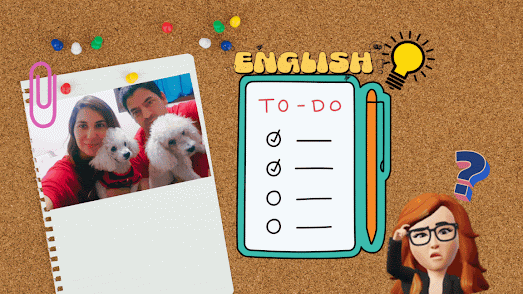From A1 to C1 in English Listening: How I Achieved It
Hello everyone!!!✋
I'm over the moon!!!! I finally achieved a C1 level (scoring 7.0 on the IELTS test) in English listening. It took 1 year and 5 months. Moreover, for me, among the 4 skills (reading, listening, writing and speaking) listening was the easiest skill to learn. Today, I will share with you what I did to achieve this outcome, showing my challenges, study techniques, how I overcame Plateaus, practice tests, and how I managed to track my development in this skill. I am learning all skills, but I was faster at listening. Additionally, I am happy with my reading skill, which I also took from A1 to B2/C1 (scoring 6.0-6.5 in the IELTS test) in 1 year and 5 months as well.
How much time does it take to go from A1 to C1 level?
Based on estimates from the Common European Framework of Reference for Languages (CEFR), it generally takes approximately 700-950 hours of instruction to reach C1 level from A1 in all skills. This equates to roughly 3-4 years of consistent study, assuming around 5-10 hours of study per week [1,2].
Remember that this is just an estimate. Several factors can influence the actual time it takes, such as your starting level, the intensity of your practice, and the effectiveness of your learning methods. Some learners might progress faster, while others might take longer.
1. https://www.englishexpress.com.sg/articles/cefr-hours-per-level-english/,
2. https://www.babbelforbusiness.com/us/blog/how-long-does-it-take-to-learn-a-language/
How many hours have I been studying English per day?
I have been dedicating 6 hours per day (Monday to Sunday) to English. However, in my day, all around me is in English (TV shows, games, newspapers, magazines, articles, social media, computer, cellphone). It is also very important to have language partners from different countries because this helps you understand real-life English. At the moment I have four partners that I talk to every week, a Canadian, two British, an American. If you would like tips about partners, you can read my 2 posts about this theme 👉Part I, Part II.
Fig. 1 A range of exams to meet different needs https://www.cambridgeenglish.org/exams-and-tests/cefr/
Initial Challenges
When I started to learn English last year, I had an A1 level. The beginning was really tough, all my study material was in English, and I needed to translate and use subtitles in the class videos. My study calendar changed almost every month because the interesting in the study changed, such as when I realized that I needed to give more attention to other skills first.
But speaking of listening, in the first 3 months, many times, it was often distressing, and painful. However, this will pass, I promise; the goal is not to give up! You will start to understand short phrases, sometimes it will make sense, other times it will not! That’s okay, this is part of the learning.
Different accents and the speed of speech drove me crazy in the first 8 months. This will get better, just don’t stop trying to understand training your ears, and studying (grammar, vocabulary, pronunciation, reading). Accents and the speed of speech are a problem for natives, imagine for us non-native speakers. However, you need to make it possible to improve that by calming down, when you don’t understand, listening again or asking for repetition!
Study Techniques
I have been developing many techniques to improve my English listening. I believe it is important you to listen every day, having routine with the listening materials, and testing your listening through online or book exams to assess your progress.
I think to achieve a C1 listening level, you need a large vocabulary, strong grammar knowledge, diverse listening sources, and to practice active listening .Furthermore, you need consistency and practice.
Let’s look at some tips:
- Listening to podcasts, news, and movies in English. You can use English subtitles, and sometimes you should try watching without subtitles, for you used to it.
- Do listening-type exercise. Listening and type the audios. My favorite website to do that 👉Dailydictation
-Practice with IELTS listening materials, there are many sites and books where you can find IELTS test to practice 👉Practice listening, Materials IELTS.
-Find language partners. You need to have different partners with different accents it helps to train your ear.
Apps, tools that helped me practice on a regular basis:
App:
ELI English
IELTS listening
BBC learnin English
6min English
Favorite Sites:
My favorite TV shows:
Peppa pig (HBO, Netflix)
Family guy (Disney)
Bob's burgers (Disney plus)
Duncanville (Disney plus)
The middle (HBO)
Lucifer (Netflix)
Dinosaurs (Disney)
The big bang theory (HBO)
Sex in the city (Netflix)
Harry Potter saga (HBO)
My wife and kids (disney plus)
The vampire diaries (HBO)
Podcasts:
More podcasts 👉Learning English in bed
Mock Tests and Tracking My Progress
Practicing IELTS listening test helped me to identify my weak areas and monitor my progress in the listening skill. Then, through practice, I realized that I needed to improve my listening when I heard names and addresses spelled out. Moreover, sometimes numbers were difficult to me listen well, then I practiced my ear for that, and definitely I improved.
I put all tests that I took in an excel Spreadsheet (fig1), and after a few months, I did an overview of my results in a graph (fig 2). This way, I was able to track my progress.
I have been practicing the IELTS listening test twice per week, but if your test is still far off, my advice is to practice it once every 2 weeks. However, if you just want to practice listening to know your level test once every 2 month. I think there is greater probability that your listening level will have changed in that time.
Fig. 2 My monitoring of listening practices
Fig. 3 My progress in English listening skills. Ten months of practicing listening through tests.
Overcoming Plateaus
When I felt that I was stagnant, I changed my study strategy and included more listening practice in my study calendar, and I read a lot to expand my vocabulary. Unfortunately, there is no secret, guys. We need to practice and learn new words and their pronunciation every day. You can also use tools like a notepad, a board, or post-it notes to help you visualize easier the vocabulary you are learning. However, sometimes it takes a little while to achieve another level, okay? Don’t worry, you will reach it.
Then, I would like to encourage you continue working towards your goals and celebrate each goal you achieve. Furthermore, you need to understand your limits. Sometimes, I do not understand things either, but you need to remain focused and not be discouraged just because you weren't able to do something today. Try again and again, tomorrow is another day, and you can do better. I am going through this too, and I know the feeling of failure, anger and sadness. How many times have I cried because I thought it was impossible, that I was not capable for that. It is important to have someone with you to help you not give up and to keep your head up. If you want to vent, you can send me an email. J I will try help to you!
Xoxo✋💗





.gif)




Comments
Post a Comment